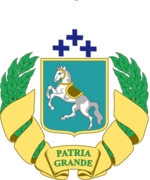Politics of Carinansia
Politics of Carinansia | |
|---|---|
 | |
| Polity type | Federal presidential constitutional republic |
| Constitution | Serene Constitution |
| Formation | May 19, 1966 |
| Legislative branch | |
| Name | National Congress |
| Type | Unicameral |
| Meeting place | Capitol |
| Presiding officer | Angélica Gálvez, President of the National Congress |
| Appointer | Democracy |
| Executive branch | |
| Head of State and Government | |
| Title | President |
| Currently | Jeremías Escribano |
| Appointer | Democracy |
| Cabinet | |
| Name | Cabinet of the Serenacy |
| Current cabinet | Cabinet of Jeremías Escribano |
| Leader | President |
| Deputy leader | Vice President |
| Appointer | President |
| Headquarters | Casa Central |
| Ministries | 14 |
| Judicial branch | |
| Name | Federal judiciary of Carinansia |
| Courts | Courts of the Serenacy |
| High Court | |
| Chief judge | Sacniete Aguayo |
| Seat | High Court Building |
The politics of Carinansia function within a framework of a federal presidential representative democratic republic whose government is based on a multi-party congressional system, where the President is both head of state and head of government. The federal government represents the Serenacy of Carinansia. It is divided into three branches: executive, legislative, and judicial, as established by the Political Constitution of the Serenacy of Carinansia, published in 1966. The constituent states of the federation must also have a republican form of government based on a congressional system as established by their respective constitutions.
The executive branch is exercised by the executive branch, headed by the President, and advised by a cabinet of secretaries independent of the legislature. Legislative power is vested in the National Congress, a single-chamber legislature comprising of 513 senators. Judicial power is exercised by the judiciary, consisting of the High Court of the Nation, the Council of the Federal Judiciary, and the collegiate, unitary, and district tribunals.